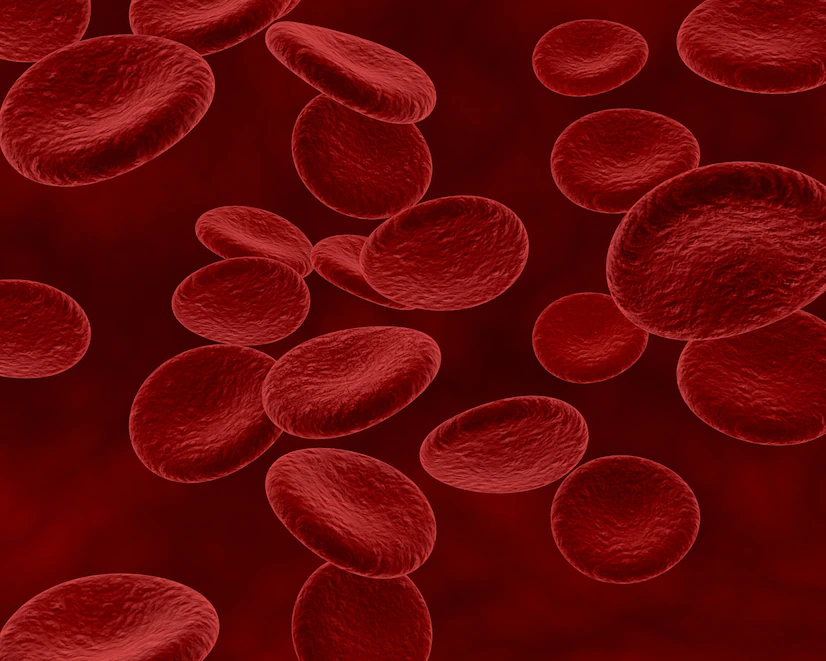Preventive Healthcare
Understanding Erythrocytes Normal Range and Count
1608 Views
0

What are Erythrocytes?
Erythrocytes or red blood cells (RBCs) are found in blood and carry oxygen to be delivered to the tissues in the body. This oxygen is converted into energy, and the tissues release carbon dioxide. Erythrocytes transport this carbon dioxide to your lungs for exhalation.
These red blood cells contain a pigment called haemoglobin that helps transport oxygen and carbon dioxide. Since this protein is made up of iron, these cells appear red. Also, since erythrocytes make up 40% of your blood, your blood appears red.
Let's understand more about what erythrocytes do and how they influence your overall health and well-being!
Where are Erythrocytes Made?
We now know what erythrocytes do, but where are they made? They are made in the soft tissue of your bones, called bone marrow, and released into the bloodstream when fully mature. It takes about seven days for erythrocytes to form and be released.
Did you know that erythrocytes have a limited lifespan because they don't have a nucleus (central membrane)? These cells have a lifespan of 120 days.
The bone marrow contains stem cells. when a stem cell commits to forming a proerythroblast, it will develop into a new red blood cell. Your body can make around two million red blood cells per second. Fascinating, right?
Common Disorders that Affect Erythrocytes
The erythrocyte's normal range varies from person to person:
- Men: 4.7 to 6.1 million per microlitre of blood
- Women: 4.2 to 5.4 million per microlitre of blood
- Children: 4.0 to 5.5 million per microlitre of blood
If your erythrocyte count is above or below the mentioned range, then your doctor may ask you to perform additional tests. Do get in touch with a physician as soon as you feel any of the symptoms.
Low Erythrocyte Count
Causes of low erythrocyte count are:
- Anaemia: When your blood carries less oxygen than normal due to a variety of causes, including low erythrocyte count, it is called anaemia. It can make your body feel weak and tired.
- Blood loss: When your body loses more blood than it produces.
- Bone marrow disorders: Conditions like leukaemia and lymphoma can damage the bone marrow, which may cause a low erythrocyte count.
- Cancer: Some cancer and chemotherapy medications may affect the bone marrow and, thereby, the count of red blood cells.
- Vitamin deficiency: A deficiency of vitamin B9 and B12 can affect your erythrocyte count.
- Malnutrition
High Erythrocyte Count
In some conditions, erythrocyte count can increase. A rise in your erythrocyte count is called polycythemia and can increase your risk for heart attacks and stroke. Some conditions that can cause a rise in your erythrocyte count are as follows:
- Hypoxia: When the oxygen levels are low, your body tries to compensate by producing more erythrocytes
- Smoking and carbon monoxide exposure: Smoking increases your chances of carbon monoxide exposure.
- Dehydration
- Lung disease
- Congenital heart disease: When one or more structures in the heart are not normal from birth, they may affect your erythrocyte count.
- Living at a high altitude
- Performance-enhancing drugs (which may include steroids)
Symptoms of Erythrocyte Disorders?
The symptoms of erythrocyte disorders depend upon the type of condition the person may have. A few common symptoms that you may experience include:
- Fatigue
- Tiredness
- Muscle weakness
- Lack of energy
- Blurry vision
- Headache
- Dizziness
- Cold and clammy hands and feet
How is Abnormal Erythrocyte Count Treated?
Depending upon the cause of the abnormal erythrocyte count, your doctor may recommend the following management options:
- Taking vitamins if your low erythrocyte count is due to vitamin deficiency
- Eating a well-balanced diet to ensure you are getting adequate amounts of iron. This may be recommended for women during or after pregnancy.
- Treating the underlying medical condition if it is the cause of your deranged erythrocyte count.
- A blood transfusion may be required in some severe cases.
How to Maintain Optimum Red Blood Cells?
You can maintain an optimum erythrocyte count by eating a nutritious diet and including a wide range of vitamins, minerals, and other nutrients.
Here are some rich sources of iron, vitamin B9, and vitamin B12:
- Fish
- Leafy vegetables like spinach, kale
- Lentils
- Beans
- Nuts and seeds
- Dried berries
- Red meat and organ meats like liver
Book Blood Test
Conclusion
Red blood cells, or erythrocytes, are truly incredible and essential for sustaining life. Their remarkable ability to transport oxygen and nutrients throughout the body ensures the proper functioning of every organ and system.
Without these tiny yet mighty cells, our bodies would not receive the vital elements needed for survival. From their unique shape and structure to their extraordinary capacity to adapt and maintain balance, red blood cells continue to awe scientists and medical professionals alike. If you are showing signs of low or high erythrocyte count, your doctor may recommend you undergo a CBC test. Need help with it? Book your test with Metropolis Labs today! We provide comfortable and seamless home test options
 Home Visit
Home Visit Upload
Upload














1701259759.webp)









 WhatsApp
WhatsApp